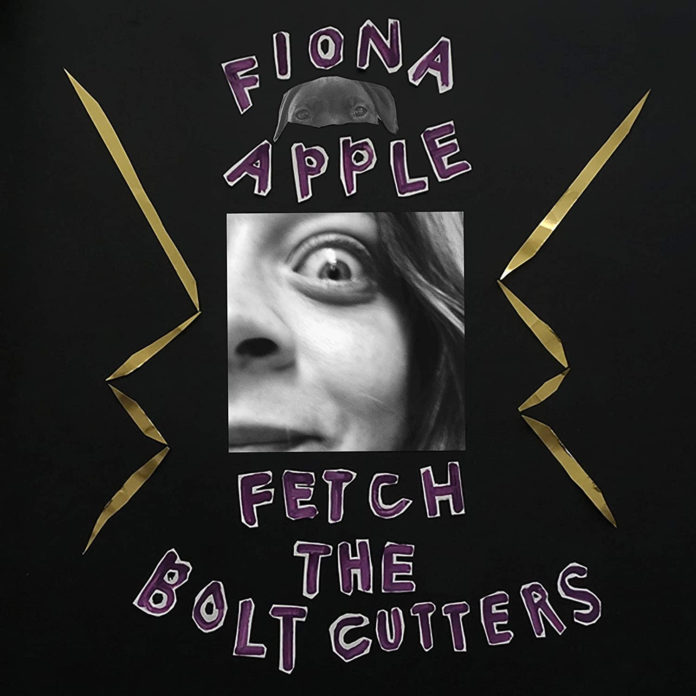
Given that 2019 was such an incredible year for new music, many music fans expected artists to continue that momentum and lead their sounds into new places, but, as the first quarter of 2020 went by, no albums seemed to stand out from the rest, and, in March, many music fans found themselves sheltered in place, their hunger for something special only increasing tenfold. Listeners were searching for something to pull them out of their isolative ruts.
Only one thing was certain: Fiona Apple would release an album, and it would be great. After an eight-year hiatus, she returned in April with her godsend Fetch the Bolt Cutters, an ode to the “MeToo” movement and the sonic amplification of women’s struggles.
Fetch The Bolt Cutters—the fifth album from the 42-year-old veteran—is Apple’s most unchained and raw release. Her vocals tend to be boundless in style. On the opening track, alone “I Want You to Love Me,” Apple goes through countless vocal changes. The vocals ease in on the piano melody before Apple sings, “And I know when I go, all my particles will disband and disperse and I’ll be back in the pulse,” adding a snarl subtle enough to make the progression of the song gradual and earned, anticipating the changes to follow. In a mere one minute and 30 seconds, Apple asserts her abandonment of all fears, even death itself. Her bitter lyrical passages camouflage the poetic metaphors in her songwriting; soon, her growls morph into soaring hums, giving way to Yoko Ono-inspired dolphin calls that screech against the scattered avant-jazz piano rolls in the final act of the song.
Apple takes qualities usually associated with inconsistencies in music—absurdity and unpredictability—and morphs them into some of the most endearing aspects of the album, capturing the listener’s over Bolt Cutters’ nearly 52-minute running time.
One of the most fascinating and enjoyable aspects of the album is its do-it-yourself production and sound. Instead of using a standard drum-kit for most of the percussion on the record, Apple puts together percussive assortments from whatever she discovers in her musical toy-box. The title-track “Fetch the Bolt Cutters” is layered with abnormalities filling the recording: gentle taps of metal cans, brush-stroked snares, splashy cymbal crashes and even a choir of heavenly dog barks. “I grew up in the shoes they told me I could fill, shoes that were not made for running up that hill,” Apple sings, adding another layer of depth to the haphazard ensemble.
Although each song is delicately arranged and liberating in a lively way—mostly due to Apple’s constantly shifting vocal confidence—the usage of commonplace objects and instruments makes each song feel less like an emotionally compressed studio recording and more like a personal endeavor tackling the political shortcomings most people are too scared to confront. Despite how theatrical she may come off, Apple will always be surrounded by traumas, fears and insecurities. “I’ve been sucking it in so long, I’m busting at the seams,” she sings on “Heavy Balloon.” The album feels like Apple is releasing a fiery downpour of rage after years of being silenced.
It’s easy to be taken over by Apple’s electrifying presence; her cocky attitude can be regarded as an instrument itself given how it galvanizes small-scale arrangements and turns them into monstrous symphonic outbursts. But when examining the lyrical content of Fetch the Bolt Cutters, listeners find the unshackling of a group’s silence: Apple has stated the album is about setting oneself free and disregarding fears of speaking out.
Many of the songs are anecdotal recollections from Apple’s childhood or her experiences from relationships and growing in the music industry as a young star, fighting against the ostracizing nature of the business. “Rack of His” sees Apple reminiscing about her lost innocence, while almost scolding her past self for thinking that someone would truly love her. “Check out that rack of his, look at that row of guitar necks. Lined up like eager fillies, outstretched like legs of Rockettes,” she sings. Apple examines her own objectification by observing and contemplating the orderly positioning of an ex-lover’s guitars.
Fiona Apple’s Fetch the Bolt Cutters is an angst-filled celebration of her newfound freedom. Laced with homemade, pounding percussion and her infectious confidence, the album is empowering and perfect for helping us reconnect even as society grows distantly apart.











